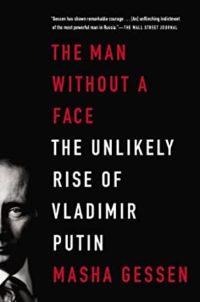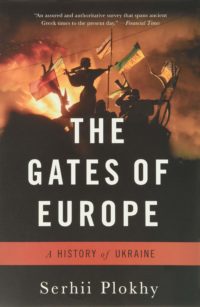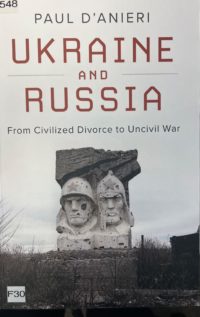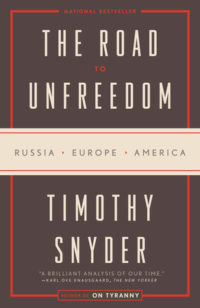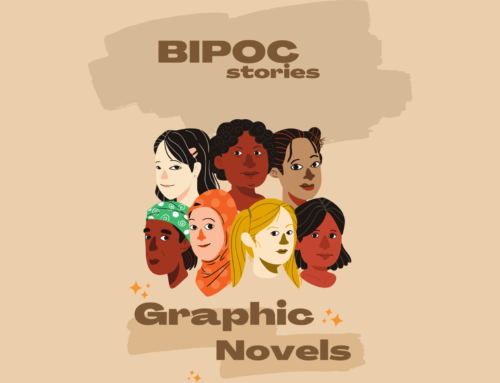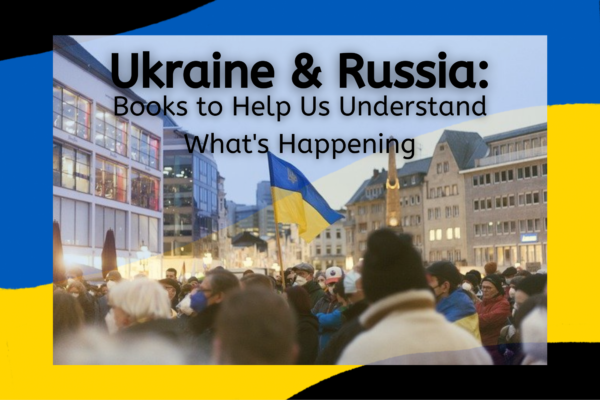
Needless to say, the invasion of Ukraine can be frightening and confusing. You might be asking yourself questions like “Why is this happening?”, “How did this start?”, and “What is the point of this?”
Form the USA Today article, “Ten Books to Help Understand What’s Happening in Russia and Ukraine”, these are very common questions to have, along with many others.
“In times of great confusion and despair, books are always there to light the way and help us better understand. These 10 books – written by Ukrainians, Russians, journalists and academics – help clarify the deep-seated conflict between Russia and Ukraine, making sense of Putin’s authoritarianism, Ukraine’s fight for independence and the far-reaching geopolitical forces at play that threaten Western democracy.” (USA Today and VanDenburg)
To help understand what is going on between Ukraine and Russia, they have curated a booklist to help answer some of the questions. Additionally, you can find more information in the CCPL databases. We selected a few to help get you started.
Available Titles for Checkout
Lessons From the Edge: A Memoir by Marie Yovanovitch
An inspiring and urgent memoir by the former U.S. ambassador to Ukraine. Marie Yovanovitch was at the height of her diplomatic career when it all came crashing down. In the middle of her third ambassadorship — a rarity in the world of diplomacy — she was targeted by a smear campaign and abruptly recalled from her post in Kyiv, Ukraine. In the months that followed, she endured personal tragedy while simultaneously being pulled into the blinding lights of the first impeachment inquiry of Donald Trump. It was a time of chaos and pain, for her and for the nation.
The Future is History: How Totalitarianism Reclaimed Russia by Masha Gessen
The Man Without a Face: The Unlikely Rise of Vladimir Putin by Masha Gessen
Gates of Europe: A History of Ukraine by Serhii Plokhy
From one of the foremost experts on Ukraine and the former USSR, a concise, authoritative history of Ukraine. Ukraine is currently embroiled in a tense battle with Russia to preserve its economic and political independence. But today’s conflict is only the latest in a long history of battles over Ukraine’s existence as a sovereign nation. As award-winning historian Serhii Plokhy argues in The Gates of Europe, we must examine Ukraine’s past in order to understand its fraught present and likely future. Situated between Europe, Russia, and the Asian East, Ukraine was shaped by the empires that have used it as a strategic gateway between East and West–from the Romans and Ottomans to the Third Reich and the Soviet Union, all have engaged in global fights for supremacy on Ukrainian soil. Each invading army left a lasting mark on the landscape and on the population, making modern Ukraine an amalgam of competing cultures. Authoritative and vividly written, The Gates of Europe will be the definitive history of Ukraine for years to come.
Ukraine and Russia: From Civilized Divorce to Uncivil War by Paul D’Anieri
D’Anieri explores the dynamics within Ukraine, between Ukraine and Russia, and between Russia and the West, that emerged with the collapse of the Soviet Union and eventually led to war in 2014. Proceeding chronologically, this book shows how Ukraine’s separation from Russia in 1991, at the time called a ‘civilized divorce’, led to what many are now calling ‘a new Cold War’. He argues that the conflict has worsened because of three underlying factors – the security dilemma, the impact of democratization on geopolitics, and the incompatible goals of a post-Cold War Europe. Rather than a peaceful situation that was squandered, D’Anieri argues that these were deep-seated pre-existing disagreements that could not be bridged, with concerning implications for the resolution of the Ukraine conflict. The book also shows how this war fits into broader patterns of contemporary international conflict and should therefore appeal to researchers working on the Russia-Ukraine conflict, Russia’s relations with the West, and conflict and geopolitics more generally.
The Road to Unfreedom: Russia, Europe, America by Timothy Snyder
From the author of On Tyranny comes a stunning new chronicle of the rise of authoritarianism from Russia to Europe and America. With the end of the Cold War, the victory of liberal democracy was thought to be final. Observers declared the end of history, confident in a peaceful, globalized future. This faith was misplaced. Authoritarianism returned to Russia, as Putin found fascist ideas that could be used to justify rule by the wealthy. In the 2010s, it has spread from east to west, aided by Russian warfare in Ukraine and cyberwar and information war in Europe and the United States. Russia found allies among nationalists, oligarchs, and radicals everywhere, and its drive to dissolve Western institutions, states, and values found resonance within the West itself. The rise of populism, the British vote against the EU, and the election of Donald Trump were all Russian goals, but their achievement reveals the vulnerability of Western societies and the uncertain character of Western political order. This fundamental challenge to democracy presents an opportunity to better understand the pillars of our own political order. In this forceful and unsparing work of contemporary history, based on vast research as well as personal reporting, Snyder goes beyond the headlines to expose the true nature of the threat to democracy and law. By revealing the stark choices before us–between equality or oligarchy, individuality or totality, truth and falsehood–Snyder restores our understanding of the basis of our way of life, offering a way forward in a time of terrible uncertainty.
On Our Way Home From the Revolution: Reflections on Ukraine by Sonya Bilocerkowycz
Following the 2014 Ukrainian revolution, a child of the Ukrainian diaspora challenges her formative ideologies, considers innocence and complicity, and questions the roots of patriotism.
Additional Database Resources
- Gale In Context: Ukraine
- Gale In Context: Russia
- The Russia-Ukraine Conflict: Teaching Moments Found in Primary Sources | Gale Blog: Library & Educator News | K12, Academic & Public
- The Russia-Ukraine Conflict: Teaching Moments Found in Primary Sources | Gale Blog: Library & Educator News | K12, Academic & Public



